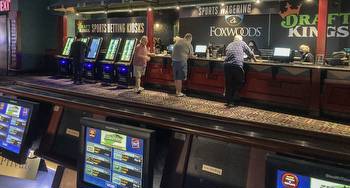'Informational' hearing yields little information about CT's digital gamblers

Gentle questioning by legislators at a hearing Monday elicited no information on the numbers or habits of the Connecticut gamblers who have wagered more than $2 billion on sports and casino games since online gambling went live in October.
Representatives of Foxwoods Resort Casino, Mohegan Sun and the CT Lottery acknowledged that data collected online could be used to produce a detailed assessment of the new market of gamblers — and to flag problems.
Rep. Maria Horn, D-Salisbury, co-chair of the Public Safety and Security Committee, suggested the state will want access to that data when it undertakes Connecticut’s first gambling impact study in 14 years.
“And I wondered if you could reflect on what that data shows, what your position would be in terms of sharing that data for consumer protection purposes,” said Horn, whose committee has jurisdiction over gambling legislation.
“It’s very early on with respect to collecting any data, only 90 days in, and understanding what that data provides,” replied Ray Pineault, the chief executive officer of Mohegan Gaming & Entertainment.
Sen. Cathy Osten, D-Sprague, the other co-chair, said after the hearing that the committee would raise a bill mandating a gambling prevalence study, most likely requiring the casinos and lottery to share their data.
“I can’t imagine they would not be forthcoming on the data,” Osten said.
Chuck Bunnell, the chief of staff to the Mohegan Tribal Council, said later the tribe would comply. A spokesperson for CT Lottery had no immediate response. The leader of the tribe that owns Foxwoods promised cooperation.
“We’re definitely going to work with the state what data that we can provide,” said Rodney Butler, tribal chair of the Mashantucket Pequots, owners of Foxwoods.
He said he would have to review privacy laws.
“Certainly it impacts how much we’re allowed to share,” he said. “But absolutely, whatever we can collaborate on the state with, we will.”
The National Council on Problem Gambling has urged any state with online gambling to require the release of anonymized data sets showing the demographics and betting habits of gamblers.
Connecticut did not mandate the release of that data in the gambling expansion signed into law on May 27 or the digital gambling regulations adopted on Sept. 27 under emergency rules without public input.
Those emergency regulations are temporary and expire on March 6.
The Department of Consumer Protection will propose permanent regulations Tuesday to the legislature’s Regulations Review Committee. They will be subject to a public hearing.
“We’re comfortable so far with how the rollout has been going,” said Michelle Seagull, the commissioner of consumer protection. “We think we’ve launched a marketplace that we opened quickly and really stayed true to the goals of the statutes and the charge that was given to us.”
Seagull said the department would continue to evaluate the safeguards against problem gambling now in place, mainly the voluntary tools embedded in the digital platforms used by FanDuel, DraftKings and PlaySugarHouse.
FanDuel and DraftKings run the sports books and digital casino games for Mohegan Sun and Foxwoods, respectively. PlaySugarHouse takes sports bets for the CT Lottery.
The state regulations require the digital platforms to notify gamblers when they reach $2,500 in lifetime spending and suspend betting until the gamblers acknowledge hitting the threshold and the ability to set betting limits.
The Department of Consumer Protection also has a voluntary self-exclusion programs that allows residents to ban themselves from the gambling sites for a year, 5 years or life.
No lawmaker asked Monday how many gamblers have reached the $2,500 threshold, nor did they press casinos or lotteries to disclose how many residents had opened online gambling accounts.
The state has collected nearly $10 million in taxes on the new online gambling, but the money has gone to the state’s general fund, not programs for the prevention or treatment of problem gambling.
Diana Goode, the executive director of the non-profit Connecticut Council on Problem Gambling, complained that its funding is insufficient to adequately staff its helpline, a 24-hour hotline and referral service for gamblers, or counter the barrage of gambling ads by FanDuel, DraftKings and, to a lesser extent, PlaySugarHouse.
The council has a $750,000 budget that is funded primarily by voluntary contributions from the casinos and a grant from the state Department of Mental Health and Addiction Services, which has been getting $2.3 million annually from the CT Lottery.
Goode said the council can afford only nominal spending on marketing, and the requirement that the council’s helpline number be included in industry ads has been little help.
“One of our issues is, if you’re watching television and you see a gambling ad, the helpline number is flashed for maybe two seconds on the screen,” Goode said. “It’s not enough time for you to read that number. It’s probably not even enough time for you to know what that number is.”
The new law requires the two casinos each to contribute $500,000 to programs that address addiction by the end of the fiscal year, but the recipients are left to the discretion of the casinos. Tribal officials say they will maintain the current level of voluntary contributions, while Goode is pressing for an increase.
The law also requires the lottery to increase its payments to DMHAS by $1 million. Goode said the council is expecting to get about $64,000 in additional funding from the department, boosting its annual budget to about $800,000.
No one from DMHAS was invited to testify, but Goode said the regional outpatient programs funded by the department are excellent. The department signed three-year contracts in 2019, providing $1.3 million a year to the private treatment providers.
“The quality of treatment in the state isn’t the issue — getting people into that quality treatment is the issue,” Goode said. “And the helpline really is that bridge.”



































